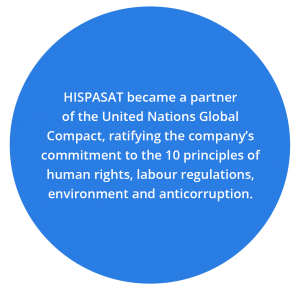In 2016, HISPASAT continued making progress in the area of Corporate Social Responsibility (CSR) through the development of actions intended to comply with the commitments acquired in three areas defined in the CSR policy, which has been in force since 2015: responsible economic management, the development of people and the community and respect for the environment.
UNITED NATIONS GLOBAL COMPACT
In 2016, HISPASAT became a partner of the United Nations Global Compact, ratifying the company’s commitment with 10 principles for CSR in the area of human rights, labour regulations, environment and anticorruption. The operator will support and develop these principles within their own activity and within their area of influence. Thus, the operator generates added value for its customers and shareholders, as well as other stakeholders with which it interacts: suppliers, employees, communities, etc.
AGREEMENT WITH THE UN
Since 2015, HISPASAT has held to an agreement with the United Nations committing it to provide satellite capacity and terminals to restore communications in natural disasters and emergencies, thereby assisting in the rescue and reconstruction tasks carried out by the Office for the Coordination of Humanitarian Affairs (OCHA), the United Nations agency in charge of coordinating humanitarian aid.
The agreement, which was prepared by the ESOA (EMEA Satellite Operators Association) and GVF (Global VSAT Forum), guarantees that HISPASAT and the other participating operators will provide full operating capacity through their satellite networks, based on their availability, to reception points. The solution also includes land equipment and reception terminals and offers the necessary training to first response coordinators in order to enable them to successfully apply the communication solutions.
AGREEMENT WITH THE TEATRO REAL
In support of the spread of culture through Spanish institutions, HISPASAT continued to collaborate with the Teatro Real in 2016. The company provides space capacity for live broadcasting via satellite of a maximum of ten shows every year. The agreement, signed in 2015, also allows these performances in the Teatro Real to be shown in theatres around the world thanks to satellite broadcasting.
FUNDACIÓN ATRESMEDIA
In 2016, HISPASAT collaborated with the Fundación Atresmedia, financing part of the broadcasting costs of the television channel Fan3, intended for children hospitalised in Spanish hospitals.
FUNDACIÓN ESTUDIANTES
HISPASAT continued to support Fundación Estudiantes by sponsoring the bilingual “EstuCamp” summer school for young wheelchair basketball players. HISPASAT sponsored all 40 scholarships to attend the camp, as well as a portion of the camp’s management and organisational costs. The Spanish operator sees a number of points in common with the camp’s core principles, both in terms of its own business activities, an important part of which is sports broadcasting, as well as the values of honesty, commitment and teamwork, which are inherent to sports.
Moreover, in 2016, HISPASAT, Fundación Estudiantes and AMEB (Spina Bifida Association of Madrid) joined forces to create a school for wheelchair basketball. EstuAMEB. This school facilitates disabled youth’s participation in wheelchair basketball and foster their integration, supporting the development of their techniques and their psychomotor skills, as well as their abilities in social and educational environments.

EARTH HOUR
In 2016, HISPASAT, along with Abertis and Cellnex, participated in the “Earth Hour” campaign and turned off the lights at their headquarters in Madrid and Barcelona in a symbolic gesture of solidarity with the planet. This global initiative for the protection of the environment is promoted by the World Wildlife Fund (WWF).
PROMOTING CAREERS FOR WOMEN
In line with the commitments acquired in HISPASAT’s CSR policy for the development of people and community, and specifically, for education and equality, in 2016 the company participated in different initiatives with the goal of fostering technical careers for women.
One initiative was a workshop at its Control Centre in Arganda del Rey, Madrid, to promote STEM (Science, Technology, Engineering and Mathematics) careers for women and encourage them to pursue technical degrees at university level. The workshop, attended by 30 girls ages 9 to 12, is part of Science Week, celebrated from 7 to 20 November and organised by the Knowledge Foundation of the Community of Madrid.
In this same line of work, in July 2016 a technical scholarship was established for women and will be granted in 2017 for enrolment in the master in Aeronautical engineering or Telecommunications.
With regard to equality, at HISPASAT the majority of scholarships are currently occupied by women and the selection of professionals began in 2016 through blind CV policies.
Training policy and promotion processes established by the company are equal and equal rights, social benefits and pay are all guaranteed, at HISPASAT.
SOLIDARITY SPONSORSHIPS
During this year, HISPASAT renewed its commitment to the “Multiply for the Children” programme of UNICEF and to the GAVI project for child vaccination promoted by the Caixa and an alliance of partner companies. In both cases the goal is to improve the lives of children in African and Asian countries with limited means, contributing to their health, their nutrition and access to education. It also collaborated with Acnur by making a donation to the “Emergency in Syria and Iraq”, with the aim of helping to alleviate the situation for refugees who are fleeing war in these countries through a charity run, organised by Fundación Créate, the funding from which was destined to fostering entrepreneurship at Spanish educational centres.
HISPASAT ended the year by collaborating once again on different social projects and participating in charity initiatives, such as the collaboration with the Food Bank and with the Envera Association, a non-profit organisation whose mission is aiding the integration of people with disabilities into a social and working environment, assisting them throughout their entire life cycle.




